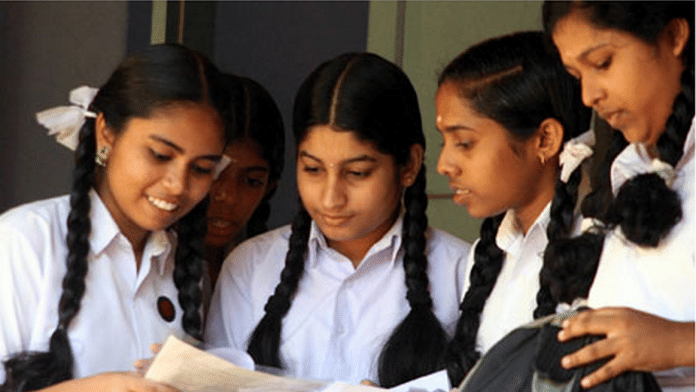New Delhi: The lack of teachers, a less than comprehensive syllabus, unwillingness from schools to offer the subject and disinterested parents may have all combined to result in the dreadful response for theatre studies, which the Central Board of Secondary Education (CBSE) offered as an optional subject under the vocational category for Class 12 students.
Of the over 12 lakh children who appeared for Class 12 board exams this year, only one opted for theatre studies. This absolute lack of interest has forced the board to discontinue the subject from the 2019-20 academic session.
Theatre studies was under the vocational category that CBSE offered students of classes 11 and 12. Apart from the compulsory subjects, students are supposed to choose at least three vocational subjects. But this choice also depends on whether their schools provide those options.
ThePrint spoke to a wide range of stakeholders to understand the lack of interest in a subject that CBSE offered in a bid to provide a holistic education.
Also read: Across India, only 2 students took CBSE’s Class 12 theatre & gender studies courses
A limited syllabus
The syllabus for theatre studies was designed by CBSE experts with help from the National School of Drama (NSD). The Class 12 textbook has seven chapters starting with the history of Indian and western theatre. It then goes on to teach technical aspects of theatre such as stage setting, production, lighting, costumes among others.
In the chapter Modern and Contemporary Indian Theatre, students are introduced to Bhartendu Harish Chandra’s acclaimed work Andher Nagri Chaupat Raja, Rabindranath Tagore’s Valmiki Pratibha and Dak Ghar. Among contemporary artists, it figures Girish Karnad’s work.
The chapter does not deep-dive into these works. It, however, has a note urging students to read all the plays mentioned. Ghashiram Kotwal, Adhe Adhure, Andhayug, Evam Indrajit and Hayavadana are some of the plays that the book recommends.
Another chapter talks about modern and western theatre and provides a glimpse of the works of Anton Chekhov, Henrik Ibsen, August Strindberg, Bernard Shaw, Eugene Gladstone O’Neill, Eugene Ionesco, Samuel Beckett and Tom Stoppard. This chapter also encourages students to read the works of these artists.
‘Covered only basics’
Those who knew the syllabus say that it wasn’t a bad one but just that it covered only the basics of theatre.
“The theatre studies syllabus taught in schools is good for beginners but it definitely needs improvement,” Abdul Latif Khatana, a faculty member at NSD who helped CBSE prepare the syllabus, told ThePrint. “CBSE needs to introspect and revisit the whole idea of introducing theatre studies as a subject and review why it didn’t work.
“There are many other factors that would contribute to low interest in the subject,” he added. “Like, there should have been a chance to perform plays, carry out practicals and not just read about it from the books. If schools are not providing all that, the interest will decline.”
Former NSD PRO, A.K. Baruah said, “There is a lot of interest in theatre as a hobby. I can say this because we used to get a lot of children aged 8 to 15 years of age at NSD. Maybe children don’t want to study it as a subject in school but take it up as a hobby.”
Acclaimed lyricist Swanand Kirkire said he was surprised by the poor response to the subject.
“Acting is very popular among young people in India, hence it is surprising to see that no one wants to study theatre studies at the school level,” he said. “Maybe they are not promoting it that well. It is a subject where one needs to go for practicals and not just read theory. I think if it’s taught well, more students will opt for it.”
Also read: Forget cramming, CBSE will reward students for creative answers from this year
Not enough teachers, say schools
According to CBSE officials, many schools don’t offer subjects such as theatre studies, which is why there is less interest among students. Schools, on the other hand, defend themselves by saying that they don’t have enough qualified teachers.
“We don’t offer the subject in our school because we don’t have competent teachers,” Vamsi Krishna, principal, Delhi Public School, Surat, told ThePrint over the phone. “Unless we have competent people, like those from the theatre industry, to come to teach in schools, we cannot do justice to the subject. Hence in our school, we do not even offer it,” he said.
“Also, parents are not interested in letting their children opt for a subject like theatre studies because they see no point in it,” added Krishna. “This is the reason we had to discontinue the entire humanities stream in our school. Parents want their children to study only science.”
Ameeta Vattal, principal, Springdales School, Delhi, said, “Vocational subjects are taken by students who are not able to cope with academics. They pick vocational subjects to later get into the earn and learn programme in college, which is an avenue for employment.
“Now even a regular person has to struggle to get employment in theatre; it is a difficult industry and that is why not many parents let their children opt for it. As a hobby it is good.”






